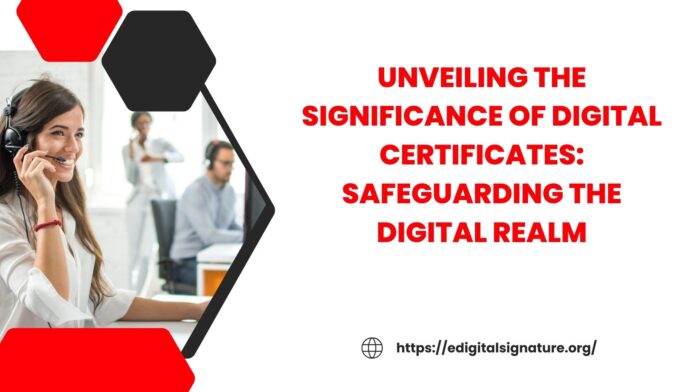Introduction
In our increasingly digitized world, where data breaches and cyberattacks loom as persistent threats, the importance of security cannot be overstated. In this landscape, digital certificates have emerged as a cornerstone of online security. They play a crucial role in ensuring the confidentiality, integrity, and authenticity of digital communications and transactions. This article delves into the multifaceted purpose of digital certificates, shedding light on how they protect our digital lives.
Understanding Digital Certificates
Before we dive into their purposes, let’s grasp what digital certificates are. At its core, a digital certificate is a cryptographic credential issued by a trusted entity known as a Certificate Authority (CA). It essentially serves as a digital identity card for entities in the digital world, such as websites, individuals, and devices.
Ensuring Data Privacy
One of the primary purposes of digital certificates is to safeguard data privacy. When you access a secure website, your browser verifies its identity through a digital certificate. This verification ensures that any data you share with the website, such as personal information or credit card details, remains confidential and encrypted during transmission. Without this verification, sensitive information could be intercepted and exploited by malicious actors.
Establishing Trust in E-commerce
In the realm of e-commerce, digital certificates are indispensable. They enable the establishment of trust between online businesses and customers. When you see the padlock icon in your browser’s address bar or a URL starting with “https://,” it signifies that the website has been authenticated by a digital certificate. This trust empowers consumers to make online transactions with confidence, knowing their financial information is secure.
Safeguarding Email Communications
Email has become an integral part of our professional and personal lives. Digital certificates play a vital role in securing email communications. They ensure that the sender’s identity is verified, preventing spoofing and phishing attacks. Digital certificates also enable the encryption of email content, ensuring that only the intended recipient can decipher the message.
Securing Network Communications
In the world of networks and information exchange, digital certificates are instrumental in securing connections. Whether it’s connecting to a Wi-Fi network, VPN, or remote server, digital certificates verify the identity of the network or server you’re connecting to. This verification helps protect against man-in-the-middle attacks and data interception.
Enabling Code Signing
Software applications are prevalent in our lives, and digital certificates are used for code signing. Code signing certificates authenticate the origin of software, ensuring it hasn’t been tampered with or infected by malware. This helps users trust the software they download and install on their devices.
Identity Verification in IoT
As the Internet of Things (IoT) continues to grow, so does the need for secure device communication. Digital certificates authenticate IoT devices, ensuring that they can only interact with authorized endpoints. This prevents unauthorized access to critical systems and data.
Securing Government and Healthcare
Digital certificates are extensively used in government and healthcare sectors to protect sensitive data. They secure electronic medical records, ensure the authenticity of government websites, and facilitate secure access to citizens’ information.
Regulatory Compliance
In many industries, compliance with data protection regulations is mandatory. Digital certificates assist organizations in meeting these requirements. For instance, the General Data Protection Regulation (GDPR) mandates the protection of personal data, which can be achieved through encryption and secure communication, both reliant on digital certificates.
Suggested Read: Digital Signature Certificate for Income Tax
Conclusion
In conclusion, digital certificates are the unsung heroes of our digital world. Their purpose extends far beyond mere encryption; they are the linchpin of trust, enabling secure online interactions, protecting sensitive data, and ensuring the integrity of digital communications. As our reliance on digital technology continues to deepen, the role of digital certificates in safeguarding our digital realm becomes increasingly vital. Embracing their importance and understanding their purpose is essential for all who navigate the vast landscape of the internet.



